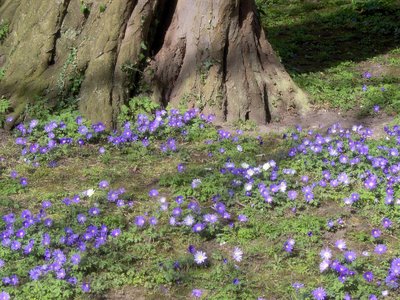this too
Friday, April 28, 2006
Delicatesse
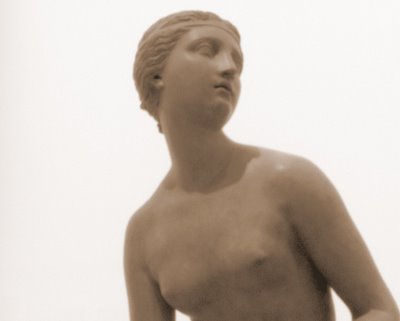

A statue by John Gibson. Not generally my kind of thing. But somehow, her delicacy, in the light gently filtered through the opaque windows of the Royal Academy’s Sackler Wing… lovely.





A statue by John Gibson. Not generally my kind of thing. But somehow, her delicacy, in the light gently filtered through the opaque windows of the Royal Academy’s Sackler Wing… lovely.



Thursday, April 27, 2006
Tuesday, April 25, 2006
Monday, April 17, 2006
A good man
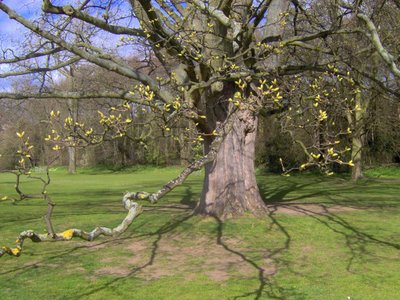
Norman Kember, the British peace worker kidnapped in Iraq with Tom Fox, the American who was murdered by their captors, and two Canadian colleagues, was interviewed on the radio a couple of days ago.
The media picked up and repeated endlessly two quite predictable things he said (approximate quotations only):
Do you think you underestimated the risk of kidnap?
Yes, we probably did.
How did you feel about the SAS group that rescued you?
I was grateful. It's ironic, of course - me, a pacifist who disapproves of the army, owing my life to men from the SAS, the most violent group of all. But of course I was happy to see them and am grateful.
I wondered if I'd heard the same interview. How grossly the media fail sometimes. What lingered in my mind was the quality of the man. How he didn't try to impress or justify, but quietly told the facts, with no care for making an impression.
No passionate stating of his case, but only 'Most Iraqis are fine people. We felt so sorry for them, and wanted them to know that.'
Most strikingly, no impulse to manage his own image, to make himself the hero of a story. How many of us could resist that? How many of us would have said, ruefully, when asked about his relationship with fellow captives, 'Well, this isn't very nice, but after a while [after several weeks of days spent sitting in a row, backs to a wall, handcuffed together], I couldn't bear the Canadians' accent - I expect they felt the same about mine'.
His simplicity touched my heart. I think I will remember Norman Kember. I keep hearing his dry, undramatic voice and how it gave way, when asked about his wife, to silence and a gulping sob.

Norman Kember, the British peace worker kidnapped in Iraq with Tom Fox, the American who was murdered by their captors, and two Canadian colleagues, was interviewed on the radio a couple of days ago.
The media picked up and repeated endlessly two quite predictable things he said (approximate quotations only):
Do you think you underestimated the risk of kidnap?
Yes, we probably did.
How did you feel about the SAS group that rescued you?
I was grateful. It's ironic, of course - me, a pacifist who disapproves of the army, owing my life to men from the SAS, the most violent group of all. But of course I was happy to see them and am grateful.
I wondered if I'd heard the same interview. How grossly the media fail sometimes. What lingered in my mind was the quality of the man. How he didn't try to impress or justify, but quietly told the facts, with no care for making an impression.
No passionate stating of his case, but only 'Most Iraqis are fine people. We felt so sorry for them, and wanted them to know that.'
Most strikingly, no impulse to manage his own image, to make himself the hero of a story. How many of us could resist that? How many of us would have said, ruefully, when asked about his relationship with fellow captives, 'Well, this isn't very nice, but after a while [after several weeks of days spent sitting in a row, backs to a wall, handcuffed together], I couldn't bear the Canadians' accent - I expect they felt the same about mine'.
His simplicity touched my heart. I think I will remember Norman Kember. I keep hearing his dry, undramatic voice and how it gave way, when asked about his wife, to silence and a gulping sob.
Thursday, April 13, 2006
Reflecting
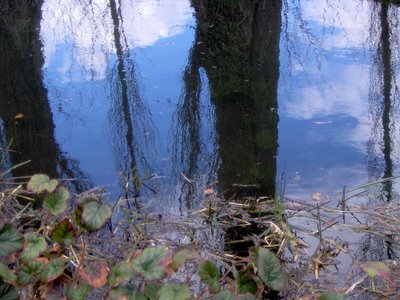
Being more open, more exposed – I’m intrigued by the way reflecting on my possible move to an open, blowy landscape has shifted into wider reflections on this theme. There’s probably nothing more important to any chance of change, communication, useful action. I’ve spent most of my life, you see, shutting myself down, pretending hard that I’m not here.
What a wonderful refuge imagination has proved. Without it’s sheltering arms, and later those of literature, how unbearably miserable I would have found life. And so, a solitary person, living mostly in my mind, is who I’ve been.
And, as well as a great blessing, it’s been a great curse, of course. Much of adult life has been a battle to come out and meet the world: a battle sometimes won, because of dear people happening along, because of passionate political feelings, because of a job that took me all over the world, the magic of the strange and new demolishing my reserve; and a battle often lost in drifts of depression and isolation.
What really made the tide start to turn a bit in recent years was beginning to practice Buddhist meditation – a practice of meeting the body, the breath, the air, in the present; of opening the heart to the here-and-now, to self, to others; setting up a pattern counter to that other pattern of closure adopted early in life. It was the ineffable encounter with the right thing at the right time. Sometimes I have a mad urge to be an evangelist for it – one of those dreadful street preachers with a megaphone. But the right thing at the right time is something so personal, not to be foisted on anyone.
However, it is time to say again that the online group I’m part of, over at 100 Days meditation blog, will start a new 100 days on Saturday 15 April. New meditators, in any tradition, are welcome then or at any time.

Being more open, more exposed – I’m intrigued by the way reflecting on my possible move to an open, blowy landscape has shifted into wider reflections on this theme. There’s probably nothing more important to any chance of change, communication, useful action. I’ve spent most of my life, you see, shutting myself down, pretending hard that I’m not here.
What a wonderful refuge imagination has proved. Without it’s sheltering arms, and later those of literature, how unbearably miserable I would have found life. And so, a solitary person, living mostly in my mind, is who I’ve been.
And, as well as a great blessing, it’s been a great curse, of course. Much of adult life has been a battle to come out and meet the world: a battle sometimes won, because of dear people happening along, because of passionate political feelings, because of a job that took me all over the world, the magic of the strange and new demolishing my reserve; and a battle often lost in drifts of depression and isolation.
What really made the tide start to turn a bit in recent years was beginning to practice Buddhist meditation – a practice of meeting the body, the breath, the air, in the present; of opening the heart to the here-and-now, to self, to others; setting up a pattern counter to that other pattern of closure adopted early in life. It was the ineffable encounter with the right thing at the right time. Sometimes I have a mad urge to be an evangelist for it – one of those dreadful street preachers with a megaphone. But the right thing at the right time is something so personal, not to be foisted on anyone.
However, it is time to say again that the online group I’m part of, over at 100 Days meditation blog, will start a new 100 days on Saturday 15 April. New meditators, in any tradition, are welcome then or at any time.
Tuesday, April 11, 2006
What is the wind?

The wind rushes to meet you across these wide open spaces, taking your breath away, slicing into you.
Break you open or tear you apart - is there a difference, except in the words chosen to describe it?
Is the harsh wind to be viewed as aggressor or as an exciting, provocative companion? - as attacker or merely as pushing you hard, to a place beyond resistance?
Attracted, repelled, reminded of all the other conflicting forces that buffet you, you hesitate.
Hover long enough in the doorway of new experience, and the wind will take you anyway.
Fly with it, then - or turn and run for your life!
I found great resonance in Isabel’s comment here yesterday: “I […] moved to a wide open landscape in middle age and found it both exhilarating and intimidating to relearn how to live without cover… exposed.”
In a long, intense meeting on Sunday with my companions in this possible venture to make a new home, I pushed myself, full of trepidation, to express my discomfort with the overexcited and inconsiderate way we had been exchanging views, interrupting each other. Didn’t say it especially well and soon after I said it I, in my turn, forgot myself and spoke roughly in just the way I had drawn attention to. But I was glad I had spoken, felt exposed, but also held and appreciated by the group - the tight, closed feeling of discontent replaced by honesty and warmth.
This is the way I want to be. If being in a wide open, windy place were to prove a support to this, I would be glad of it.

The wind rushes to meet you across these wide open spaces, taking your breath away, slicing into you.
Break you open or tear you apart - is there a difference, except in the words chosen to describe it?
Is the harsh wind to be viewed as aggressor or as an exciting, provocative companion? - as attacker or merely as pushing you hard, to a place beyond resistance?
Attracted, repelled, reminded of all the other conflicting forces that buffet you, you hesitate.
Hover long enough in the doorway of new experience, and the wind will take you anyway.
Fly with it, then - or turn and run for your life!
I found great resonance in Isabel’s comment here yesterday: “I […] moved to a wide open landscape in middle age and found it both exhilarating and intimidating to relearn how to live without cover… exposed.”
In a long, intense meeting on Sunday with my companions in this possible venture to make a new home, I pushed myself, full of trepidation, to express my discomfort with the overexcited and inconsiderate way we had been exchanging views, interrupting each other. Didn’t say it especially well and soon after I said it I, in my turn, forgot myself and spoke roughly in just the way I had drawn attention to. But I was glad I had spoken, felt exposed, but also held and appreciated by the group - the tight, closed feeling of discontent replaced by honesty and warmth.
This is the way I want to be. If being in a wide open, windy place were to prove a support to this, I would be glad of it.
Monday, April 10, 2006
Fens

Fens [this is an explanatory link to Wikipedia]. Flat. Endless vistas, wide skies, SPAAACE – I love that. It pleases me aesthetically, and can lift my heart. A horizon is a wonderful thing, which I have often missed and craved while living in London. But cold. The wind shrieks cruelly with nothing for a long, long way to the East to stem it’s force. This landscape isn’t gentle; doesn’t shelter. I love this place as long as I feel strong and energetic. In more vulnerable moods, it’s not always an easy place to be.

This may become home. It’s the best possibility to arise in ages. We will know within the next few weeks, probably, whether it can happen.


Fens [this is an explanatory link to Wikipedia]. Flat. Endless vistas, wide skies, SPAAACE – I love that. It pleases me aesthetically, and can lift my heart. A horizon is a wonderful thing, which I have often missed and craved while living in London. But cold. The wind shrieks cruelly with nothing for a long, long way to the East to stem it’s force. This landscape isn’t gentle; doesn’t shelter. I love this place as long as I feel strong and energetic. In more vulnerable moods, it’s not always an easy place to be.

This may become home. It’s the best possibility to arise in ages. We will know within the next few weeks, probably, whether it can happen.

Thursday, April 06, 2006
Dying swans
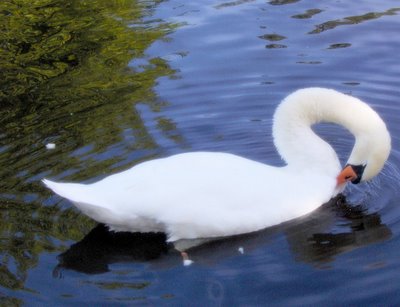
So, the lethal strain of bird flu has been confirmed today in Scotland in a dead Mute Swan (the native British species - I think this is one).
I remember the lurking thoughts of the virus at the back of my mind when I took this picture in Windsor Great Park some months ago, drawn to the common but always appealing beauty of a whole flock of them. A new and deeper fear replacing vague memories of being warned as a child that swans, if disturbed, might peck me.
Most immediately, I feel for the farmers who fear a re-run of the terrible experience of the most recent Foot-and-Mouth epidemic and the way it was dealt with here: the chaotic slaughter, the countryside filled with stinking piles of corpses and smoking pyres, the livelihoods lost overnight, the government seen as enemy not safety net, the ministry so reviled it had to change its name.
Despite the blanket media coverage over many months, I find I have little idea, really, of the level of risk. Perception of risk - the degree to which we are taught to fear crime and strangers, for example - is so commonly, so massively distorted.
I read the comments from my friends Pica and Dale with ever-so-slight indignation, thinking: well, I know that, I didn't mean I don't know that, I do read the more thoughtful newspapers, what I don't know is... then I realised I'd fallen into the trap of what I was criticising. Risk means WE DON'T KNOW. The "knowledge society" deals very badly with not knowing and would rather catastrophise than admit to uncertainty.

So, the lethal strain of bird flu has been confirmed today in Scotland in a dead Mute Swan (the native British species - I think this is one).
I remember the lurking thoughts of the virus at the back of my mind when I took this picture in Windsor Great Park some months ago, drawn to the common but always appealing beauty of a whole flock of them. A new and deeper fear replacing vague memories of being warned as a child that swans, if disturbed, might peck me.
Most immediately, I feel for the farmers who fear a re-run of the terrible experience of the most recent Foot-and-Mouth epidemic and the way it was dealt with here: the chaotic slaughter, the countryside filled with stinking piles of corpses and smoking pyres, the livelihoods lost overnight, the government seen as enemy not safety net, the ministry so reviled it had to change its name.
Despite the blanket media coverage over many months, I find I have little idea, really, of the level of risk. Perception of risk - the degree to which we are taught to fear crime and strangers, for example - is so commonly, so massively distorted.
I read the comments from my friends Pica and Dale with ever-so-slight indignation, thinking: well, I know that, I didn't mean I don't know that, I do read the more thoughtful newspapers, what I don't know is... then I realised I'd fallen into the trap of what I was criticising. Risk means WE DON'T KNOW. The "knowledge society" deals very badly with not knowing and would rather catastrophise than admit to uncertainty.
Wednesday, April 05, 2006
Perspectives
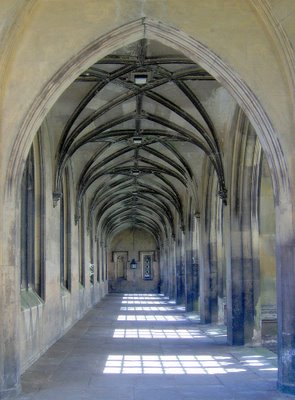
There’s something so beguiling and satisfying about views through archways, down corridors. Their symmetry delights the eye, and something deeper than the eye. They offer what life so utterly lacks, but the human spirit never learns to stop seeking. Edges. Frames. Tidy, finite, fixed perspectives. A sense of being held, but - with a view away into the distance - not of constraint. A pleasure indeed to look at, but important to see the illusion.
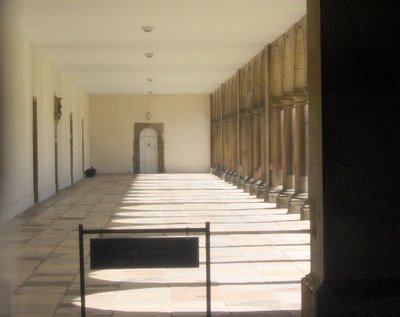
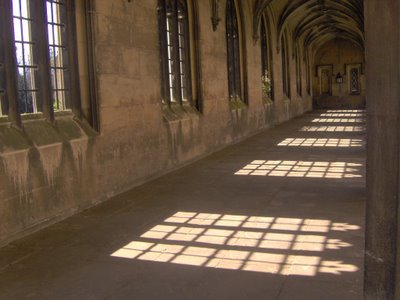
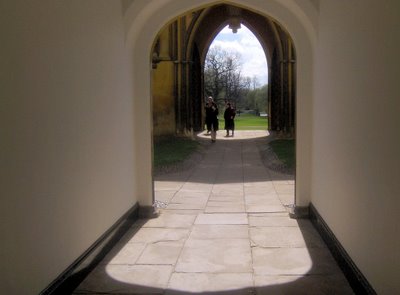
St John's & Trinity Colleges, Cambridge

There’s something so beguiling and satisfying about views through archways, down corridors. Their symmetry delights the eye, and something deeper than the eye. They offer what life so utterly lacks, but the human spirit never learns to stop seeking. Edges. Frames. Tidy, finite, fixed perspectives. A sense of being held, but - with a view away into the distance - not of constraint. A pleasure indeed to look at, but important to see the illusion.



St John's & Trinity Colleges, Cambridge
Monday, April 03, 2006
Somewhere here?

Here is a place. Bright, but gusty, in these wild and not yet welcoming early days of nearly-Spring. Could this be home?
For several years I’ve longed to move away from London, but, with no compulsion, no prescribed destination, floundered over doing it. After many explorations and contacts, some possibilities have gradually emerged. And now, suddenly, there are two – two concrete, interesting, tempting, different options.

So hard to imagine. So hard to want. Wanting means risking disappointment. Emotional investment in a possibility is something I fear, but know I soon must make. So in the coming weeks I’ll be hanging out a bit in both places, letting myself imagine, letting myself want, opening to intimations of what it would be like.
But, assiduously as I may research the social and cultural facilities, the local development plan, long as I may linger in the town cafes and explore the country walks, much as I may close my eyes and open my heart to atmosphere, that great intangible that is ‘feeling at home’ will not become predictable. It will be a leap, a risk. And I who am timid, who have let life push me around – do I have it in me to leap?

(No, I'm not actually contemplating living on a barge)
I have loved a place, as deeply and wholly as I have loved a person. But it didn’t happen overnight. I long to have that again, but know it isn’t something you can will.

Things have been sticky lately and I’m feeling tired and a bit shut down – not unhappy, but signally lacking in outgoing energy and enthusiasm, as evidenced by recent inability to choke out more than the odd sentence on this here blog. The longing for a new home and a different lifestyle has got itself somewhat submerged under coping from day to day. How, in this mood, do I open to these new possibilities? All muffled up still in my Winter clothes, how do I rub up against these places and see how they feel?


Here is a place. Bright, but gusty, in these wild and not yet welcoming early days of nearly-Spring. Could this be home?
For several years I’ve longed to move away from London, but, with no compulsion, no prescribed destination, floundered over doing it. After many explorations and contacts, some possibilities have gradually emerged. And now, suddenly, there are two – two concrete, interesting, tempting, different options.

So hard to imagine. So hard to want. Wanting means risking disappointment. Emotional investment in a possibility is something I fear, but know I soon must make. So in the coming weeks I’ll be hanging out a bit in both places, letting myself imagine, letting myself want, opening to intimations of what it would be like.
But, assiduously as I may research the social and cultural facilities, the local development plan, long as I may linger in the town cafes and explore the country walks, much as I may close my eyes and open my heart to atmosphere, that great intangible that is ‘feeling at home’ will not become predictable. It will be a leap, a risk. And I who am timid, who have let life push me around – do I have it in me to leap?

(No, I'm not actually contemplating living on a barge)
I have loved a place, as deeply and wholly as I have loved a person. But it didn’t happen overnight. I long to have that again, but know it isn’t something you can will.

Things have been sticky lately and I’m feeling tired and a bit shut down – not unhappy, but signally lacking in outgoing energy and enthusiasm, as evidenced by recent inability to choke out more than the odd sentence on this here blog. The longing for a new home and a different lifestyle has got itself somewhat submerged under coping from day to day. How, in this mood, do I open to these new possibilities? All muffled up still in my Winter clothes, how do I rub up against these places and see how they feel?





